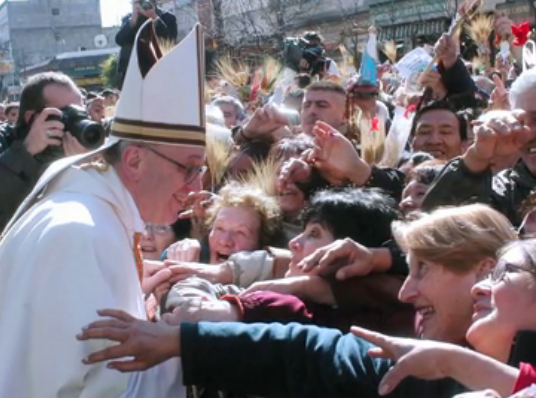While Australia’s Jesuit educated political leaders quibble over the leadership spats of yesteryear, Jesuit priest cum Roman Pontiff Francis has released a new encyclical.
In the years of Pope Benedict XVI, mainstream media would have barely reacted to the utterances of the Holy Father, save to criticise some categorical statement about sexual ethics.
Today, media outlets around the world are in a Francis frenzy – climaxing with the Pope’s publication of a new authoritative Church document on the environment. The Guardian has called the Pope’s latest encyclical an “explosive intervention” that could anger “Vatican Conservatives” and “right wing church circles”. Working off a leaked early version of the document, the Washington Post wrote that “the draft reveals Francis as part policy wonk and part lyricist”.
Mr Abbott’s office has even gone to the trouble of reiterating their position on the climate change debate, gesturing to their ‘Direct Action plan’.
Why all the feverish commentary? I wish I could say there has been a genuine interest in the intellectual and theological content of the Pope’s document. He does, after all, explore at length deep social inequalities in the developing world and humanity’s treatment of the environment, in line with the rich tradition of Catholic social teaching.
This Pope, furthermore, is like a contemporary Catholic William James, reconceptualising important social issues with powerful phrases like ‘human ecology’ and ‘cultural euthanasia’.
There is a richness of wisdom in these ideas that the modern, globalised world would do well to explore.
Unfortunately though, this Pope Francis’s vision of deus et natura has been – at least until now – jammed through mainstream media cookie-cutter political categories.
“Is the Pope a ‘Red Radical’?” asked the BBC’s Ed Stourton in an in-depth special report earlier this month. The New York Times has used the occasion of the new encyclical to discuss growing tensions in the Vatican. They flagged the upcoming Vatican Synod on the family as a “big showdown” (as if the Vatican were putting on a performance of High Noon).
In the Washington Post Haley Gray Scott lectured so called ‘conservatives’ about the origins of their political creed in conservationism: “conservatives can gladly welcome Pope Francis’s words on creation care.”

Amidst the frenzied and political charged commentary someone has occasionally bothered to actually enquire into what an ‘encyclical’ actually is.
For the love of God (or nature)! Can we just stop for a second and actually look at the document itself.
Here’s just one brief suggestion as to why it’s significant:
The encyclical Laudato Si deftly brings together two apparently disparate stands of thought in Western intellectual history – the transcendent sense of connectedness with nature present in Franciscan spirituality, and the neo-Romanticism of the modern environmentalist movement. It may sound like a pastiche, but in age of tension between supposed ‘conservative’ Catholics and ‘progressive’ environmentalists, I think it’s quite interesting.
The title of the Encyclical is taken from a spiritual canticle of Catholic Saint Francis of Assisi, in which Assisi describes human dependence on nature, and praises God for creations such as "Brother Fire" and "Sister Water".
Throughout his new encyclical, in chapters like “the Human root of the Ecological Crisis” and “the Gospel of Creation”, Pope Francis explores the relationship of ‘dominion’ between man and nature described in Genesis (the first book of the Bible), and argues that this gives humankind no license to ravage our surrounds:
“[the Earth]is protesting for the wrong that we are doing to her, because of the irresponsible use and abuse of the goods that God has placed on her. We have grown up thinking that we were her owners and dominators, authorised to loot her.”
At the same time, the Pope uses concepts of ‘ecology’ and ‘interconnectedness with nature’ to provide a rationally acceptable platform with which to dialogue with the non-religious of the world (and in particular, the largely atheistic modern environmentalist movement).
He praises the global ecological movement, which has “already travelled a long, rich road and has given rise to numerous groups of ordinary people that have inspired reflection”.
I could go further into the theological intricacies, but at risk of losing a modern audience, I’ll leave it at that.
Suffice to say that Pope Francis’s document is more than just a political statement on the environment. This Pope, while staying faithful to age-old teachings of the Catholic Church, is trying to go beyond traditional political divisions and present a vision of Catholic Church that intersects with the fundamental tenets of the modern environmentalist movement.
Unfortunately, though, I have a funny feeling we won’t see Mr Abbott and Senator Di Natale embracing over Ladato Si. The man in white gets a lot of media attention, but that coverage rarely conveys the profundity of his message.
Donate To New Matilda
New Matilda is a small, independent media outlet. We survive through reader contributions, and never losing a lawsuit. If you got something from this article, giving something back helps us to continue speaking truth to power. Every little bit counts.



